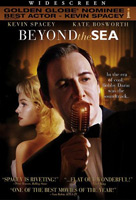 BUY IT AT AMAZON: CLICK HERE!
BUY IT AT AMAZON: CLICK HERE!
STUDIO: Lion’s Gate Films
MSRP: $27.98 RATED: PG-13
RUNNING TIME: 118 mins.
SPECIAL FEATURES:
• Audio commentary
• "Making of" featurette
This
project was seventeen years old by the time it finally made it into production,
which puts it immediately at odds with its subject, Bobby Darin. Darin, as the
promotional materials say, had everything going for him but time; we are
intended to see him as a quintessential flameout, the musical analogue to James
Dean, but this biopic moves so deliberately as to make Darin feel more like a
man who grew old quickly and died right on time.
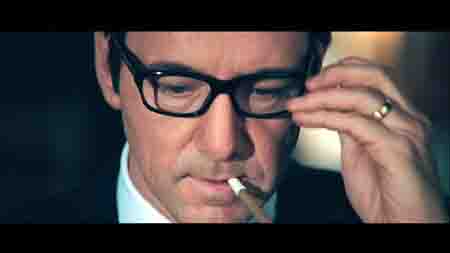
So emo.
from Kevin Spacey (am I alone in being unfamiliar with Albino Alligator?) who
also stars. It starts with Spacey as Darin in the midst of shooting his own
biopic, getting frustrated with the imperfections in his backing band, and
generally being a difficult bastard. Despite showcasing a sadly truncated
version of "Mack the Knife", this sequence ends up overly confusing
in its attempt to set up the structure for the rest of the film. It ends with
Darin having an argument with the child actor (William Ullrich) hired to play
young Bobby Darin for the biopic-within-the-biopic. Does this sound difficult
to follow? It is, and this is from the script credited in part to Lewis Colick,
who was originally hired by
hasn’t been time to tighten the structure.
Through
some feat of magic, the child actor takes Bobby back to his home in the
memories that we follow through the rest of the film. This structure is the
movie’s weakest point: we never revisit the set of Darin’s movie in any fashion
other than ambiguous fantasy, so we’re unsure what the opening even represents.
Is it narrative device? Is it a fever dream? Is Bobby Darin really Jacob
Singer? It’s a misstep early on that, fortunately, gets forgotten in the
flashbacks.
Darin had rheumatic fever early in his life to the degree that it damaged his
heart. Doctors told him that he would be lucky to live to his fifteenth
birthday. His mother, played with an excess of life by Brenda Blethyn, is
determined that he should make the most of his life, however long it is, and
starts him on the road to the entertainment business. She teaches him all the
vaudeville dances she knows and instructs him in the piano, the guitar, the
trumpet. Young Bobby takes to these methods of escape like a shark to blood,
and when he comes of age (Spacey, playing a twenty-something, which is very
similar to Spacey playing a forty-something) he starts playing the club
circuit.
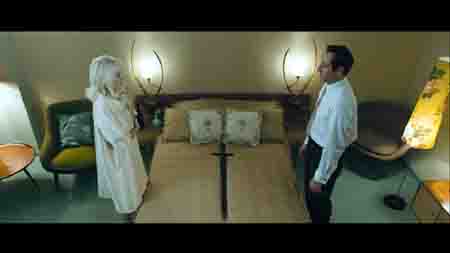
"By Balmung, I swear my virility is unmatched."
This is
where the second quibble with the structure comes out, and its a problem that
plagues a lot of biographies. There is very little momentum to the narrative.
Right from the beginning, we are robbed from any investment in the
rags-to-riches story because Bobby finds his success within about seven minutes
of screen time. What follows is tired object lessons that tell us that success
is often more of a curse than a blessing. Darin meets actress Sandra Dee on a
movie set, marries her, and moves on up. Spacey portrays Darin as an affable,
ruthless sort of guy who pushes himself up each rung in the ladder of success
with equal measures of humor and carelessness. It’s compelling only for the
level of dedication Spacey invests in the character; there just isn’t time or
room left for the audience to join him in Darin’s head.
Spacey
does a convincing job as Darin — partly because of the singer’s early aging
and hair loss — and covers a wide enough range of emotion, but there’s always
that distance between audience and actor that makes his portrayal of Darin feel
as though it is being filtered through a mirror instead of coming to us live.
Kate Bosworth, as Sandra Dee, does a beautiful job, but the scenes she has with
Spacey just serve to reinforce the remoteness of the latter.
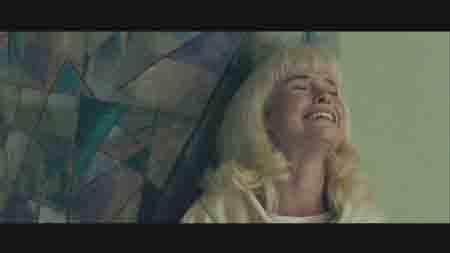
"It’s not just art! It’s my soul!"
The movie
hits its stride right around when Darin realizes he has grown old and
irrelevant. It’s at this point that the mish-mash structure, along with its
accompanying collision of cinematographic styles, smoothes out. For a while, we
get to enjoy Darin coming to terms with his perceived failure, his audience
abandoning him. These scenes are played well, with only a touch too much cliché
in the speeches. It’s gratifying, then, that the lesson Darin walks away with
after all his "Old Man and the Sea" time isn’t cribbed from a young
adult novel. He discovers a theory of fame that ought to ring true with any
performer, no matter the level, that considers his job a mass of carefully
crafted lies.
makes for an intellectually satisfying end, but not an emotional one. Fortunately
for us, there is still one scene remaining, one last fever dream. This final
song-and-dance number, set to "As Long As We’re Singing" with young
actor Darin reappearing, does a neat job of injecting the emotion that the
final sequences were lacking.
Spacey,
at the helm and in front of the camera, has made an engaging but aimless film,
kind of like a catchy song with ordinary lyrics.
6.5 out
of 10
I
mentioned earlier the scatter of cinematography. Some sections are presented in
black & white, some brief shots in faux-60’s-handheld, some with heavier
grain and colder palette, but most are warm and smooth. Rather than supporting
the thematic elements of whatever scene they modify, these decisions, used as
infrequently as they are, are jarring.
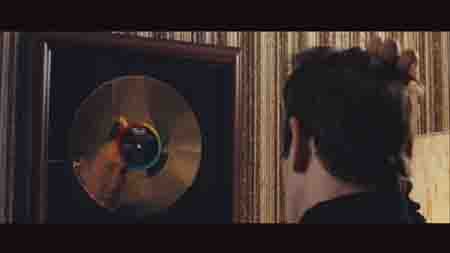
Could anything be more depressing?
Yes.
Overall,
the transfer is clean, though I did notice some visual artifacts in Chapter 5.
The range of color is presented well, for the most part, with no tones that
overwhelm the others. The filmmakers chose a lot of yellow and gold, but they
are balanced in most every shot by enough blacks and colder hues so as not to
make it look like a canary convention has descended.
8.0 out
of 10
The Noise
This is
easily the best part of the disc. The songs (all of which are sung by Kevin
Spacey, who does a damn fine job of aping Darin’s croon) are mixed perfectly in
Dolby 5.1. The backing music comes out with energy and punch, but is never
overwhelming. This is a disc that could have benefited from one of those
"skip to a song" features, such as on Hedwig and the Angry Inch.
The only sad thing is that few of the songs are presented in their entirety (as
I mentioned before with "Mack the Knife") and are often interrupted
by dialogue. I guess that’s what the soundtrack album’s for.
8.5 out
of 10

VROOOM!
Goodies
you wouldn’t expect. A commentary by Kevin Spacey and producer Andy Paterson
(which attempts to address the broken structure), a fifteen-minute "making
of" featurette, and trailers for the film. Advertised in the folder leaf
are an interview with Darin’s manager, Steve Blauner, and archival footage of
Mr. Darin performing, but neither of these are present on the disc.
There are
also Spanish subtitles but, for some reason, no English ones. Sorry, deaf
people.
4.0 out
of 10
The
Artwork
The heads
aren’t floating, at least. Syrupy golden light on Spacey (with a microphone
covering half his face) and Kate Bosworth’s pretty little profile. It gives you
a pretty good idea of what sort of cinematography you’re in for.
6.0 out
of 10
Overall
7.0 out of 10